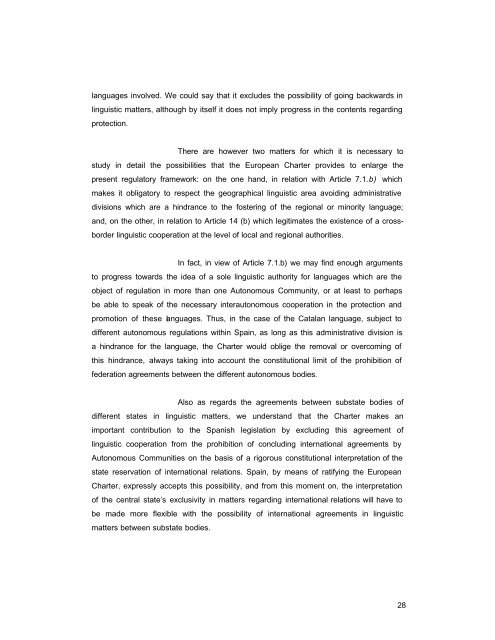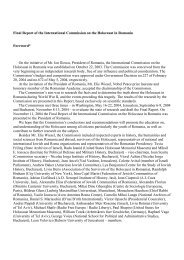get PDF document - MIRIS
get PDF document - MIRIS
get PDF document - MIRIS
You also want an ePaper? Increase the reach of your titles
YUMPU automatically turns print PDFs into web optimized ePapers that Google loves.
languages involved. We could say that it excludes the possibility of going backwards in<br />
linguistic matters, although by itself it does not imply progress in the contents regarding<br />
protection.<br />
There are however two matters for which it is necessary to<br />
study in detail the possibilities that the European Charter provides to enlarge the<br />
present regulatory framework: on the one hand, in relation with Article 7.1.b) which<br />
makes it obligatory to respect the geographical linguistic area avoiding administrative<br />
divisions which are a hindrance to the fostering of the regional or minority language;<br />
and, on the other, in relation to Article 14 (b) which legitimates the existence of a crossborder<br />
linguistic cooperation at the level of local and regional authorities.<br />
In fact, in view of Article 7.1.b) we may find enough arguments<br />
to progress towards the idea of a sole linguistic authority for languages which are the<br />
object of regulation in more than one Autonomous Community, or at least to perhaps<br />
be able to speak of the necessary interautonomous cooperation in the protection and<br />
promotion of these languages. Thus, in the case of the Catalan language, subject to<br />
different autonomous regulations within Spain, as long as this administrative division is<br />
a hindrance for the language, the Charter would oblige the removal or overcoming of<br />
this hindrance, always taking into account the constitutional limit of the prohibition of<br />
federation agreements between the different autonomous bodies.<br />
Also as regards the agreements between substate bodies of<br />
different states in linguistic matters, we understand that the Charter makes an<br />
important contribution to the Spanish legislation by excluding this agreement of<br />
linguistic cooperation from the prohibition of concluding international agreements by<br />
Autonomous Communities on the basis of a rigorous constitutional interpretation of the<br />
state reservation of international relations. Spain, by means of ratifying the European<br />
Charter, expressly accepts this possibility, and from this moment on, the interpretation<br />
of the central state’s exclusivity in matters regarding international relations will have to<br />
be made more flexible with the possibility of international agreements in linguistic<br />
matters between substate bodies.<br />
28












